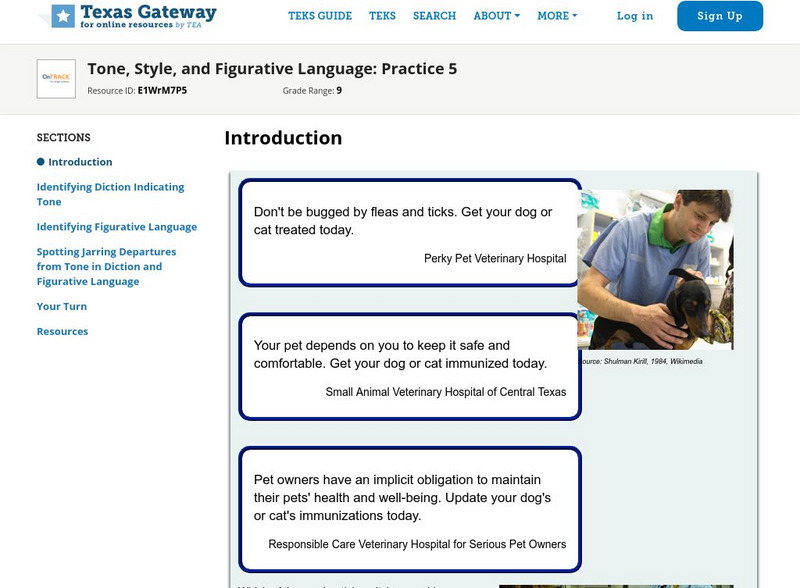California Department of Education
Plagiarism is Stealing!
Stop, thief! Do your pupils understand the consequences of plagiarism? Lesson three of six in a series of college and career readiness activities demonstrates the dangers of taking credit for someone else's work. Learners engage in...
Loudoun County Public Schools
Figurative Language Packet
A definitive resource for your figurative language unit includes several worksheets and activities to reinforce writing skills. It addresses poetic elements such as simile and metaphor, personification, hyperbole, and idioms, and...
Curated OER
A Positive Spin
Study word choice and connotation in advertising. Readers examine campaign ads, both negative and positive, from the 2006 mid-term election before discussing an article and analyze a campaign of any candidate they choose. Finally,...
National Endowment for the Humanities
The New Order for "Greater East Asia"
Sometimes the New Order becomes synonymous with its implications for European countries, but what about its consequences for East Asia? The final instructional activity in a four-part series teaches scholars about World War II. High...
National Endowment for the Humanities
Victory and the New Order in Europe
A New Order in Europe calls for a new lesson plan! This third plan in a series of four sequential lessons encourages high schoolers to read primary sources about the development of the New Order and follow up their knowledge with a...
National Endowment for the Humanities
How to Win a World War
High schoolers are have begun to learn the art of diplomacy with each other, but do they understand how diplomacy works at a global level? The second in a series of four lessons, guides scholars in evaluating primary sources....
National Endowment for the Arts
Teacher's Guide: The Great Gatsby by F. Scott Fitzgerald
A 10-lesson unit takes high schoolers through a novel study of F. Scott Fitzgerald's The Great Gatsby. To start, students learn about Fitzgerald's background and gain historical context that prepares them for a reading of the book. The...
Curated OER
What is a Metaphor? - Examples, Definition & Types
Metaphors, the definition of, types of, and examples of, are the subject of a short video that models for viewers this grand poobah of literary terms. Colorful images and animations are used to illustrate the connections between...
Curated OER
Allusion and Illusion: Definitions and Examples
Illusions and allusions certainly sound similar but there is a world of difference in their meanings. The narrator of this short video distinguishes between these terms, defines them, and offers examples that are sure to engage viewers....
Shakespeare Uncovered
Merely Players
“. . . one man in his time plays many parts,/His acts being seven ages.” Jaques famous speech from Act II, scene vii of As you Like It sets the stage for an examination of the roles people play. Class members not only consider the roles...
Curated OER
Exploring the Power of Puns
Read and analyze a variety of Shakespearean and contemporary puns using Visual Thesaurus computer software. Middle and high schoolers analyze a pun as a class; in small groups they analyze a Shakespearean pun using contextual clues and...
Curated OER
Shades of Meaning
Examine and distinguish between words that have similar definitions but different connotations. Middle schoolers define connotation and denotation and participate in a "shades of meaning" contest in small groups. Groups use the...
Webrich Software
Idioms
It's just a figure of speech, but this app is, in a nutshell, bursting at the seams with idioms. In just two shakes of a lamb's tail, learners can study, search for, and test their knowledge of the included expressions.
Curated OER
Synecdoche vs. Metonymy: Definitions
Ask your class to lend their ears, and eyes, to a short video that defines and offers examples of synecdoche and metonymy. Whether it be brand names like Kleenex® and Band-aids® that have come to stand for all the products in a category,...
Curated OER
Cliches, Paradoxes
Clichés, paradoxes, and equivocations are detailed in a short, animated video that defines and illustrates these writing traps. The resource also includes a quiz and the transcript for the video. Users can register to access free course...
Curated OER
Similes in Literature: Definition and Examples
Be as romantic as a poetic. Appear as clever as Einstein. Wow others with your powers of observation by using similes to point out the similar aspects in two different things. This short video focuses on similes found in Shakespeare and...
Curated OER
Types of Irony: Examples & Definitions
Isn’t it ironic that many situations labeled ironic aren’t? Properly labeled examples of verbal, dramatic, and situation irony are defined and illustrated in a short, animated video that uses passages from literary works as models. The...
Curated OER
It's All in the Way You Say It
High schoolers unearth multiple meanings based on connotation and cadence. After defining denotation, connotation, and cadence, readers evaluate similar words to compare connotations. They then play with how cadence affects meaning by...
Texas Education Agency
Texas Gateway: Tone, Style, and Figurative Language: Practice 5
Mark examples of figurative language and the diction that indicate tone.
Texas Education Agency
Texas Gateway: Literary Terminology: Practice 5 (English I Reading)
[Accessible by TX Educators. Free Registration/Login Required] You will practice using terminology critical for comprehension, interpretation, and analysis of poetry, drama, and fiction.
Other
St. Edward's University: Devices: Assonance/consonance
Defines and compares the use of assonance and consonance in poetry, with examples.
Ted Nellen
Cyber English (By Ted Nellen): Consonance
This is a glossary entry for the term "Consonance" including the defintion and an example.























